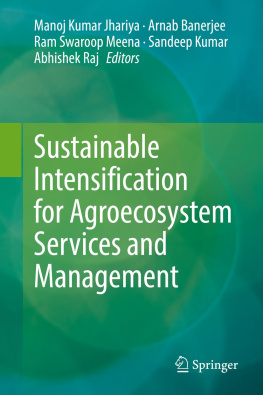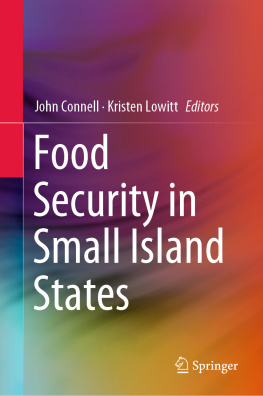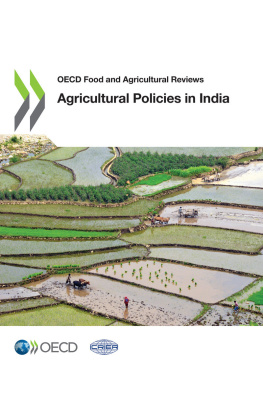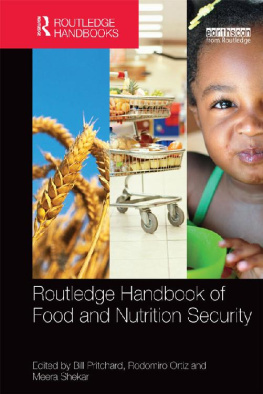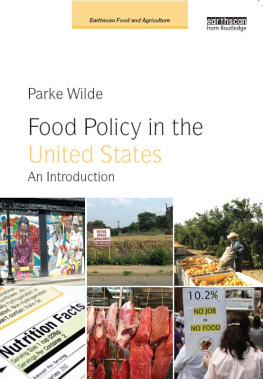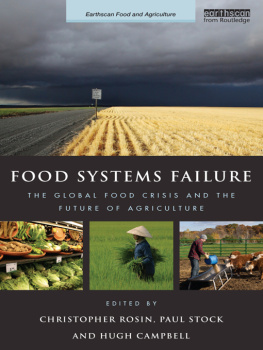SDG 2 ZERO HUNGER
CONCISE GUIDES TO THE
UNITED NATIONS
SUSTAINABLE
DEVELOPMENT GOALS
Series Editors
Walter Leal Filho
World Sustainable Development Research and Transfer Centre, Hamburg University of Applied Sciences
Mark Mifsud
Centre for Environmental Education and Research, University of Malta
This series comprises 17 short books, each examining one of the UN Sustainable Development Goals (SDGs).
The series provides an integrated assessment of the SDGs from an economic, social, environmental and cultural perspective. Books in the series critically analyse and assess the SDGs from a multi-disciplinary and a multi-regional standpoint, with each title demonstrating innovation in theoretical and empirical analysis, methodology and application of the SDG concerned.
Titles in this series have a particular focus on the means to implement the SDGs, and each one includes a short introduction to the SDG in question along with a synopsis of their implications on the economic, social, environmental and cultural domains.
SDG 2 ZERO HUNGER:
FOOD SECURITY, IMPROVED
NUTRITION AND
SUSTAINABLE AGRICULTURE
AMBE EMMANUEL CHEO
United Nations University, Germany
KUGEDERA ANDREW TAPIWA
Great Zimbabwe University, Zimbabwe
United Kingdom North America Japan India
Malaysia China
Emerald Publishing Limited
Howard House, Wagon Lane, Bingley BD16 1WA, UK
First edition 2021
2021 Ambe Emmanuel Cheo and Kugedera Andrew Tapiwa. Published under an Exclusive License by Emerald Publishing Limited
Reprints and permissions service
Contact:
No part of this book may be reproduced, stored in a retrieval system, transmitted in any form or by any means electronic, mechanical, photocopying, recording or otherwise without either the prior written permission of the publisher or a licence permitting restricted copying issued in the UK by The Copyright Licensing Agency and in the USA by The Copyright Clearance Center. No responsibility is accepted for the accuracy of information contained in the text, illustrations or advertisements. The opinions expressed in these chapters are not necessarily those of the Author or the publisher.
British Library Cataloguing in Publication Data
A catalogue record for this book is available from the British Library
ISBN: 978-1-78973-806-3 (Print)
ISBN: 978-1-78973-803-2 (Online)
ISBN: 978-1-78973-805-6 (Epub)
Disclaimer
The views expressed in this book do not reflect the views of any organization, agency or programme of the United Nations
CONTENTS
LIST OF TABLES
CHAPTER 3
CHAPTER 4
ABOUT THE AUTHORS
Dr Ambe Emmanuel Cheo holds a PhD in Environmental and Resource Management (ERM) from the Brandenburg University of Technology Cottbus-Senftenberg, Germany. His PhD thesis Integrated Water Resources Management (IWRM): Case study of the Far-North region, Cameroon was published as monographs by the Verlag Dr Kova. In his earlier research studies, he focussed on popularising the implications of climate change on water resources to policymakers, stakeholders, and vulnerable farmers, with the aim of influencing the decisions they make. Currently, he is working with the United Nations University Institute for Environment and Human Security where he is contributing to research activities, capacity building and outreach activities within the framework of projects at the Institute.
Kugedera Andrew Tapiwa holds a Postgraduate Diploma in Education from Zimbabwe Open University, an MSc in Agroforestry from Bindura University of Science Education, a BSc Honours Degree in Agriculture from the University of Zimbabwe, and a Certificate in Pig Production from the Pig Industry Board. He is a DPhil student in Land Management and Conservation and lectures on Agriculture courses at Zimbabwe Open University and Great Zimbabwe University, located in Masvingo town, where he lectures on Agriculture courses, supervises undergraduate research projects, and assists the universities in fulfilling relationships with local communities and supporting them with agricultural knowledge to increase food security. He has vast experience in agriculture, agroforestry and land management and is presently working on rainwater harvesting and agroforestry research in arid and semi-arid areas of Zimbabwe to improve sorghum productivity.
LIST OF ABBREVIATIONS
Agriculture Orientation Index AOI
Community Supported Agriculture CSA
European Union EU
Food and Agriculture Organisation FAO
Food Insecurity Experience Scale FIES
Gross Domestic Product GDP
High-level Political Forum on Sustainable Development HLPF
Inter-agency and Expert Group on SDG Indicators IAEG-SDGs
International Centre for Trade and Sustainable Development ICTSD
International Labour Organisation ILO
Non-communicable Diseases NCDs
North American Free Trade Agreement NAFTA
Public Distribution System PDS
NCD Risk Factor Collaboration NCD-RisC
Southern African Development Committee SADC
Sustainable Development Goals SDGs
Sustainable Development Goals Fund SDG Fund
United Nation Division for Sustainable Development UN-DESA
United Nation Economic and Social Council UNESCO
United Nations UN
United Nations Department of Economic and Social Affairs UN DESA
United Nations Statistics Division UNSD
World Food Programme WFP
World Health Organisation WHO
World Trade Organisation WTO
1
INTRODUCTION TO SDG-2
The sustainable development goals (SDGs) address global challenges that are crucial for human and environmental survival and set critical thresholds for the use of natural resources now and in the future. The key feature of the 2030 Agenda for Sustainable Development lies in its universality and indivisibility (Barbier & Burgess, 2017; World Bank, 2017). The goals recognise interlinkages and foster strategies that build economic development and address social needs such as education, health, social protection, and job opportunities while tackling climate change and environmental protection. The achievement of the SDGs will require the participation of everyone (governments, the private sector, civil society, and every human being across the world) and a profound transformation of how humans think and act.
SDG-2 is one of the 17 SDGs and aims to end hunger, improve nutrition, promote sustainable agriculture, and achieve food security. The fundamental aim is to ensure the availability of good-quality food that promotes a healthy life for everyone. The achievement of this goal will require large access to food and the promotion of sustainable agriculture (United Nations Economic and Social Council (UNESCO), 2019). It will also require an increase in international investments and cooperation to bolster agricultural productive capacity in developing countries (United Nations Statistics Division (UNSD), 2016a, 2016b).


